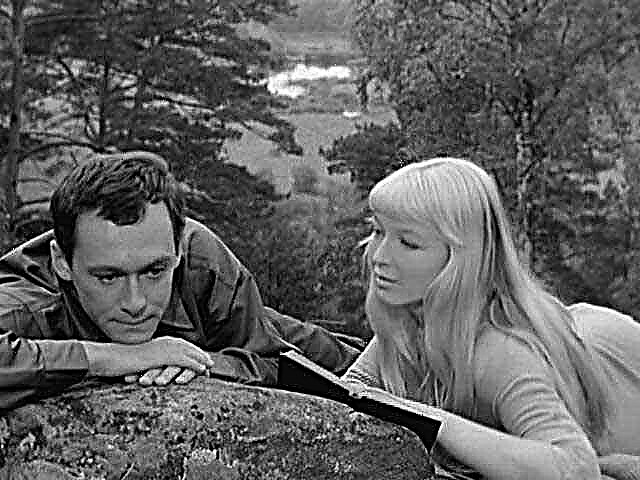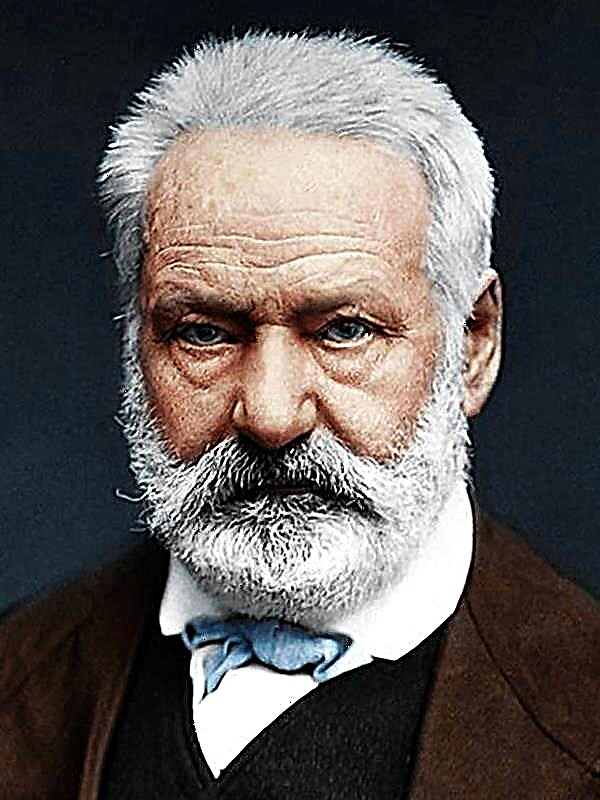The events of the play take place in Egypt, in the city of Alexandria, at the end of the reign of the XIII dynasty, in 48 BC. The legions of Caesar enter Egypt. The city is in a panic. Queen Cleopatra, a sixteen-year-old girl, disappeared. They can’t find her anywhere.
At this time, Julius Caesar, alone, in the desert passes by a small copy of the Sphinx and sees Cleopatra sleeping on the chest of a stone statue. She wakes up, says that she is the queen of Egypt, and invites Caesar, whom she calls the "old man", to climb into her and also hide from the Romans. Cleopatra is madly afraid of them. Caesar admits that he is a Roman, and says that if a girl does everything as he says, Caesar will not offend her. Cleopatra promises to become his slave and obey him in everything. Then they furtively make their way through the desert into the palace.
Cleopatra is extremely timid in the palace. She is afraid to give orders to the slave, trembles before her nanny Ftatatita. Caesar teaches her to behave royally, to command and force herself to obey. Cleopatra is getting a taste and is already dreaming of how she will “feed” her slaves with poison and throw them on the Nile to be torn to pieces by crocodiles. Caesar asks her not to get carried away. However, she is still very afraid of Caesar. When Roman soldiers enter the palace, greeting the person next to her with the words: “Glory to Caesar!”, Cleopatra suddenly gets their point, and with relief, sobbing, falls into his arms.
Tsar Ptolemy Dionysus (ten-year-old boy, Cleopatra’s brother and her rival) and his guardian Potin enter the lower hall of the palace. They are accompanied by Theodotus, the king’s mentor, Achilles, his military leader, and courtiers. Ptolemy, at the prompt of Potin, tries to express his dissatisfaction with Caesar's invasion and Cleopatra's behavior. Caesar enters the room, accompanied by the Roman officer Ruthius and his secretary, Briton, a Briton by nationality, dressed in all blue. Caesar is not inclined to shed blood in Egypt, but he demands that he be paid part of the amount of money that Egypt should give to Rome according to the old agreement between Caesar and the former king of Egypt for the fact that Caesar once helped to restore the throne. Cleopatra, who decided to act like a queen, runs up to her brother, pulls him off the throne, and herself sits in his place. Caesar, touched by the chagrin of the boy, gently calms him.
Egyptian courtiers and military leaders demand that Caesar leave their land, but he replies that he will do this only after Cleopatra becomes queen. He allows all the Egyptians to retire, to the great indignation of his associates, and warns that he will not be able to restrain Ruth and his soldiers for a long time, and those eager to snatch swords from their sheath. Potin bitterly laments Roman justice, the lack of gratitude in the Romans. Caesar is at a loss. He does not understand what is at stake. Then Potin asks Lucius Septimius to leave, who says that he killed the Republican Pompey, who wanted to defeat Caesar. Caesar is astonished; he is horrified by the crime of Lucius Septimius.
The Egyptians are leaving. Caesar stays with Cleopatra, who reproaches him with excessive sensitivity. She also tells him how her father managed to regain the throne. And he was helped by a beautiful young man who arrived from Rome with many horsemen. Then Cleopatra was only twelve years old, she fell in love with this young man. She is very surprised when Caesar tells that it was he who sent Mark Anthony to help her father. Caesar promises her that if she so desires, he will send it to her.
Caesar orders Ruthius to burn several Roman ships that are in the Western harbor, and to take all the boats that are in the Eastern harbor himself and capture Faros, an island with a lighthouse. Potin comes to Caesar and is going to express to him the demands of the Egyptians. This time, Caesar captures him. Then Theodotus runs in and in extreme excitement reports that the fire from Roman ships spread to the Alexandria Library, the holy of holies of Egyptian civilization. Caesar advises him to call for help to extinguish the fire of Achilles and his army. (So he plans to divert Achilles' attention from the capture of the island of Faros by the Romans.) Caesar puts on his armor and leaves to take part in the capture of Faros. Cleopatra begs him to be careful.
After Caesar's departure on the embankment, where the Roman guards stand, Apollodorus, a Sicilian, patrician, art lover appears. He brings Persian rugs to the palace, wanting Cleopatra to choose some of them. The queen herself runs out of the palace. She wants to immediately get into a boat and sail to Caesar. However, the guard does not allow her to do this. This is contrary to Caesar’s order. Then Cleopatra asks Apollodorus by boat to deliver to Caesar a beautiful Persian carpet as a present from her and to obtain permission for her to sail to the island to him. She runs to pick a rug. Soon, porters carry a gift from the palace, put it on a boat, and Apollodorus sets sail from the shore. When the boat is already far from the guard, Ftatatita sarcastically informs him that he missed Cleopatra, since she nevertheless got into the boat, being wrapped in a carpet.
A boat is sailing towards the island. At this time, someone throws a heavy bag into the water, the nose of the boat breaks, and it sinks. Apollodorus barely manages to get the carpet out of the water. While Caesar, British and Rufius enthusiastically watching Apollodorus and his burden, the Egyptians landed on the shore. The Romans and Cleopatra can only swim. Caesar swims carrying Cleopatra on his back. Soon, a boat approaches them, and they move on board.
The following events unfold in March 47, that is, six months after the initial events. Potin, still being held captive by Caesar and living in the palace, seeks an audience with Cleopatra and during that she behaves submissively and respectfully, sometimes tries to set up the queen against Caesar, but Cleopatra drives him away. He goes to Caesar and is eager to restore him against Cleopatra, but does not have time to do this, because the queen herself enters, going to dine with Caesar, Apollodorus and Ruthius. Caesar asks Potin to say what he wanted to say, or to leave, for he will give him freedom. Potin, after some confusion, begins to inspire him that Cleopatra wants to reign Egypt alone and with all her heart is waiting for his departure. Cleopatra indignantly claims that this is a lie. Caesar, however, finds that even if this were so, then it would be quite natural. He asks Potin to leave and repeats that he is free. Cleopatra boils with anger and quietly orders Ftatite to kill Potin before he leaves the palace. At lunch, everyone suddenly hears a scream and the sound of a body falling. Lucius Septimius enters and informs Caesar that Potin was killed and the city went mad, since Potin was a favorite of the townspeople. Cleopatra confesses that she ordered to kill Potin for his slander. Rufius and Apollodorus approve of her act. However, Caesar says that now he will not be able to protect the life of the queen from the angry Egyptians. Lucius Septimius reassures him. He reports that reinforcements arrived at the Romans - the army of Mithridates of Pergamon. Caesar goes to meet Mithridates. Before leaving, Ruthius quietly stabs Ftatatita as a wild tigress who can attack at any moment, as he later explains his act to Caesar. He approves him. Roman troops smash the Egyptians, King Ptolemy drowns in the river, and Cleopatra becomes the sovereign ruler.
Caesar is preparing to sail to Rome. Before leaving Egypt, he leaves Rufius as governor. To Cleopatra, he reiterates his promise to send Mark Anthony.












